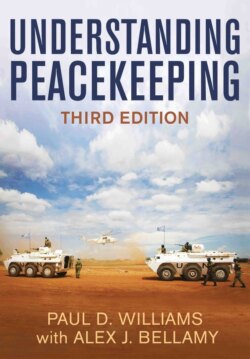Читать книгу Understanding Peacekeeping - Alex J. Bellamy - Страница 51
Box 4.1 Boutros-Ghali on the failure of UN peace operations
ОглавлениеThe international community appears paralysed in reacting … even to the revised mandate established by the Security Council. We must all recognise that in this respect, we have failed in our response to the agony of Rwanda and have thus acquiesced in the continuing loss of human lives. Our readiness and capacity for action has been demonstrated to be inadequate at best, and deplorable at worst, owing to the lack of collective political will. (31 May 1994, in Wheeler 2000: 230)
Peace-keeping in such contexts is far more complex and more expensive than when its tasks were mainly to monitor cease-fires and control buffer zones with the consent of the States involved in the conflict. Peace-keeping today can involve constant danger … It must also be recognized that the vast increase in field deployment has to be supported by an overburdened Headquarters staff that resource constraints have held at levels appropriate to an earlier, far less demanding, time. Meanwhile, there is continuing damage to the credibility of the Security Council and of the Organization as a whole when the Council adopts decisions that cannot be carried out because the necessary troops are not forthcoming. (Boutros-Ghali 1995a: §§15, 17, 98)
The limits of peace-keeping in on-going hostilities starkly highlighted by the distressing course of events in the former Yugoslavia have become clearer, as the Organization has come to realize that a mix of peace-keeping and enforcement is not the answer to a lack of consent and cooperation by the parties to the conflict. The United Nations can only be as effective as its Member States may allow it to be. The option of withdrawal raises the question of whether the international community can simply leave the afflicted population to its fate. (Boutros-Ghali 1995c: §600)
Should there be a mismatch between the international force’s mandate and its resources, there would be a risk of failure, of international casualties, and of undermined credibility for those who had put the force into the field. (Boutros-Ghali 1995c)
